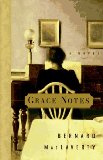

 |

|

The average rating for Grace notes based on 2 reviews is 4.5 stars.
Review # 1 was written on 2018-08-14 00:00:00 Curt Wilcox Curt WilcoxRandom thoughts (very random thoughts): I once remarked to a woman I know that I couldn't multitask. Her response: "That's because you've never had a period." My first thought was, yes that's true. Then I thought about the truth in what she said and further realized that if I had to deal with continual periods, I wouldn't have fared very well. Catherine McKenna's, the protagonist of this novel, periods are mentioned once or twice during the course of the narrative. In my experience, that's somewhat unusual in fiction by a male writer writing about a female character. A couple of years ago, I was talking with a young woman who was going to college at a school near the N.Y./Canadian border. She remarked at one point that the winters were cold enough that her nose hairs froze. I hadn't realized that women had nose hairs until then. On page 61 of Grace Notes: " The coldest she had ever been was in Kiev. The hairs in her nose had frozen when she breathed in." Mr. MacLaverty knew something about women that I didn't. I had never encountered the word "thran" before reading this novel, and had no idea what it meant. From what I can find online, it means stubborn or hard. Catherine McKenna is a composer, and music plays a major role in the book. Messiaen is mentioned several times. The only Messiaen I have in my collection is a recording of "Quatuor pour la fin du temps" ("Quartet for the End of Time"). I'd never been able to connect with that piece (I'd even read a book about its creation and initial performance in a prisoner of war camp before I ever heard it), even though I'd listened to it several times. Reading Grace Notes, along with receiving a recent email from a good friend who recounted hearing the Messiaen piece playing in a hair salon (!) in his neighborhood, got me to listen again. This time, I was able to hear the music and connect with it. I've since listened to it twice and it will no doubt be a part of my future listening. A tip of the cap to Mr. MacLaverty and to my friend for opening up my ears. On page 97: "A curtained door into the Madden's living room gave a swish. Emily's grey head appeared the way a priest's would in confession. This short passage caught my eye. I felt that it was good writing and still do. As I wrote when I began this, it's a series of very random thoughts and impressions, as opposed to a review. Others have reviewed the book and can no doubt write better reviews than I can. I'm a reader - admittedly sometimes a not very good one - rather than a reviewer. |
Review # 2 was written on 2014-06-16 00:00:00 Nicolas Van Tomme Nicolas Van TommeShortlisted for the Booker Prize 1997 I first read this book many years ago, and remember liking it a lot at the time, but I wouldn't have recalled enough to write more than a cursory review. It is the final book that I am reading or re-reading as part of the Mookse and the Gripes project to revisit the 1997 Booker shortlist, and I was a little apprehensive about rereading it because others have been rather critical of it. For me, it still works very well, though it is rather slow moving and the plot is minimal. The book is divided into two parts, and both are told chronologically, though both parts dwell quite heavily on earlier events, and it is a little unusual in that the first part describes what happened after the second part. MacLaverty's heroine Catherine Ann McKenna is a young pianist and composer from a Catholic family in Northern Ireland, and the first part describes her rather awkward homecoming for her father's funeral after a number of years in which she has not communicated with her family after an argument with her father. The action in this part takes place over a few days. The second half spans several years, initially on the Scottish island of Islay where she took a job as a music teacher and then with a friend in Glasgow after she has fled the drunken and violent father of her infant daughter. For me the book's greatest strength is the writing about classical/serious music, and I loved the way the book ended on a triumphant note with a description of the first performance of her biggest work yet, her first return to writing after motherhood and post-natal depression. The idea of a Catholic composer integrating the Lambeg drums of Orange marchers into a piece may seem a little fanciful, particularly for a book written before the Good Friday agreement, but it is a nice idea. I also related to Catherine's problems as an atheist dealing with dogmatically religious parents, and liked the way she found relief from her problems with her mother by visiting her old music teacher. I can see that this is not a book with universal appeal, but for me it was well worth revisiting. |
CAN'T FIND WHAT YOU'RE LOOKING FOR? CLICK HERE!!!